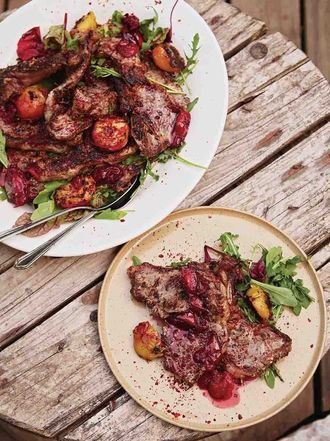On this Wikipedia the language links are at the top of the page across from the article title. In the South, barbecue is more than just a style of cooking, but a subculture with wide variation between regions, and fierce rivalry for titles at barbecue competitions. Often bbq chicken salad proprietors of Southern-style barbecue establishments in other areas originate from the South. There are usually three ingredients to barbecue—meat and wood smoke are essential.
The use of a sauce or seasoning varies widely between regional traditions. The first ingredient in the barbecue tradition is the meat. The most widely used meat in most barbecue is pork, particularly pork ribs, and also the pork shoulder for pulled pork. The techniques used to cook the meat are hot smoking and smoke cooking, distinct from cold-smoking. Characteristically, this process leaves a distinctive line of red just under the surface, where the myoglobin in the meat reacts with carbon monoxide from the smoke, and imparts the smoky taste essential to barbecue. The second ingredient in barbecue is the wood used to smoke the meat.
Since the wood smoke flavors the food, the type of wood used influences the process. Different woods impart different flavors, so the regional availability of various woods for smoking defines the taste of the region’s barbecue. Hard woods such as hickory, mesquite and various varieties of oak impart a strong smoke flavor. Maple, alder, pecan and fruit woods such as apple, pear, and cherry impart a milder, sweeter taste. Stronger flavored woods are used for pork and beef, while the lighter flavored woods are used for fish and poultry. The last, and in many cases optional, ingredient is the barbecue sauce. There are no constants, with sauces running the gamut from clear, peppered vinegars to thick, sweet, tomato and molasses sauces to mustard-based barbecue sauces, which themselves range from mild to painfully spicy.

The sauce may be used as a marinade before cooking, applied during cooking, after cooking, or used as a table sauce. An alternate to barbecue sauce is dry rub, a mixture of salt and spices applied to the meat before cooking. The origins of American barbecue date back to colonial times, with the first recorded mention in 1672 and George Washington mentions attending a “barbicue” in Alexandria, Virginia, in 1769. While barbecue is found outside of this region, the 14 core barbecue states contain 70 of the top 100 barbecue restaurants, and most top barbecue restaurants outside the region have their roots there. Barbecue in its current form came from the South, where cooks learned to slow-roast tough cuts of meat over fire pits to make them tender.
Despite these unusual traits, rib joints often have a fiercely loyal clientele. Barbecue is strongly associated with Southern cooking and culture due to its long history and evolution in the region. Indian corn cribs, predecessors to Southern barbecue, were described during the Hernando de Soto expedition in southwest Georgia, and were still around when English settlers arrived two centuries later. Today, barbecue has come to embody cultural ideals of communal recreation and faithfulness in certain areas. These ideals were historically important in farming and frontier regions throughout the South and parts of the Midwest with influences from the South.